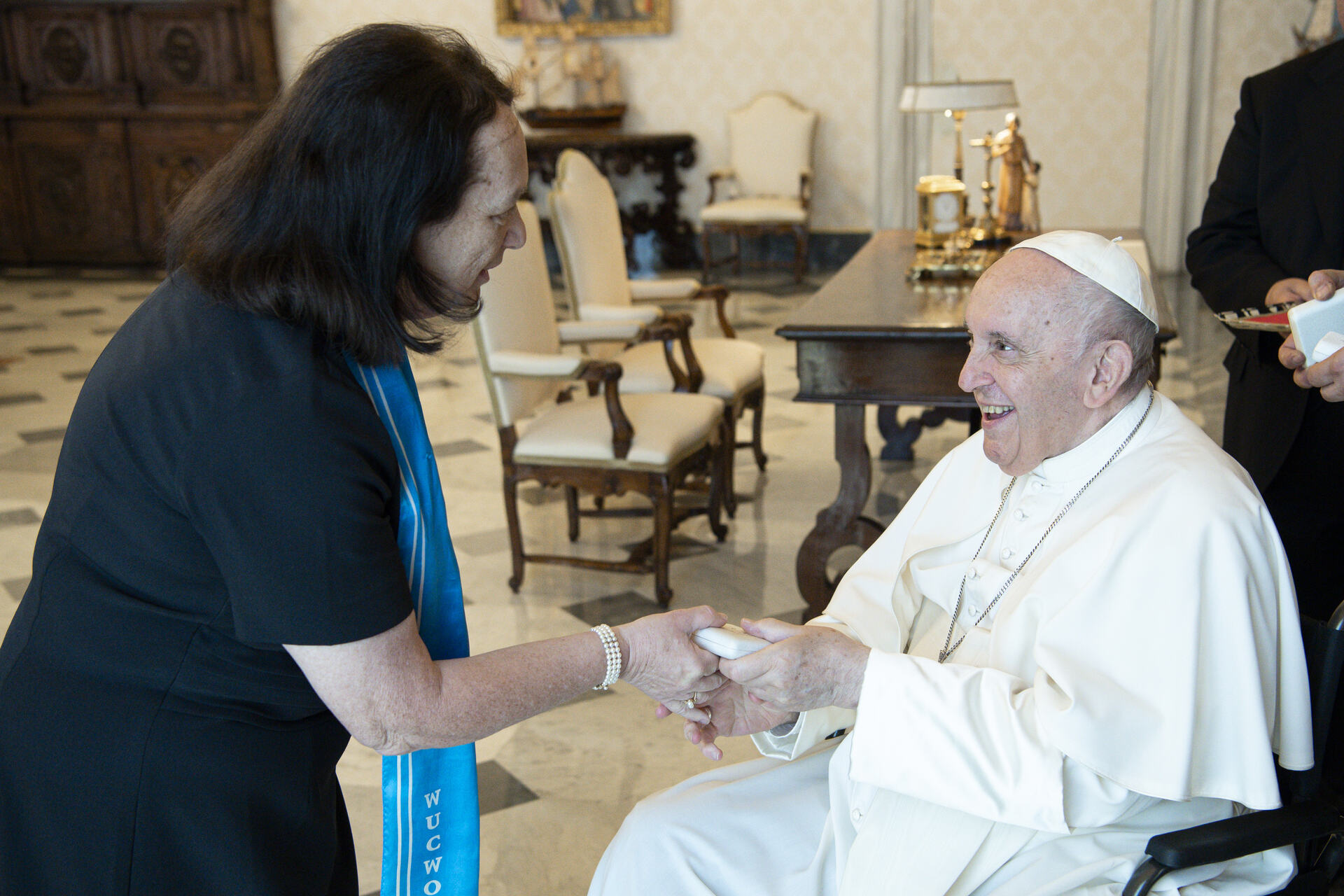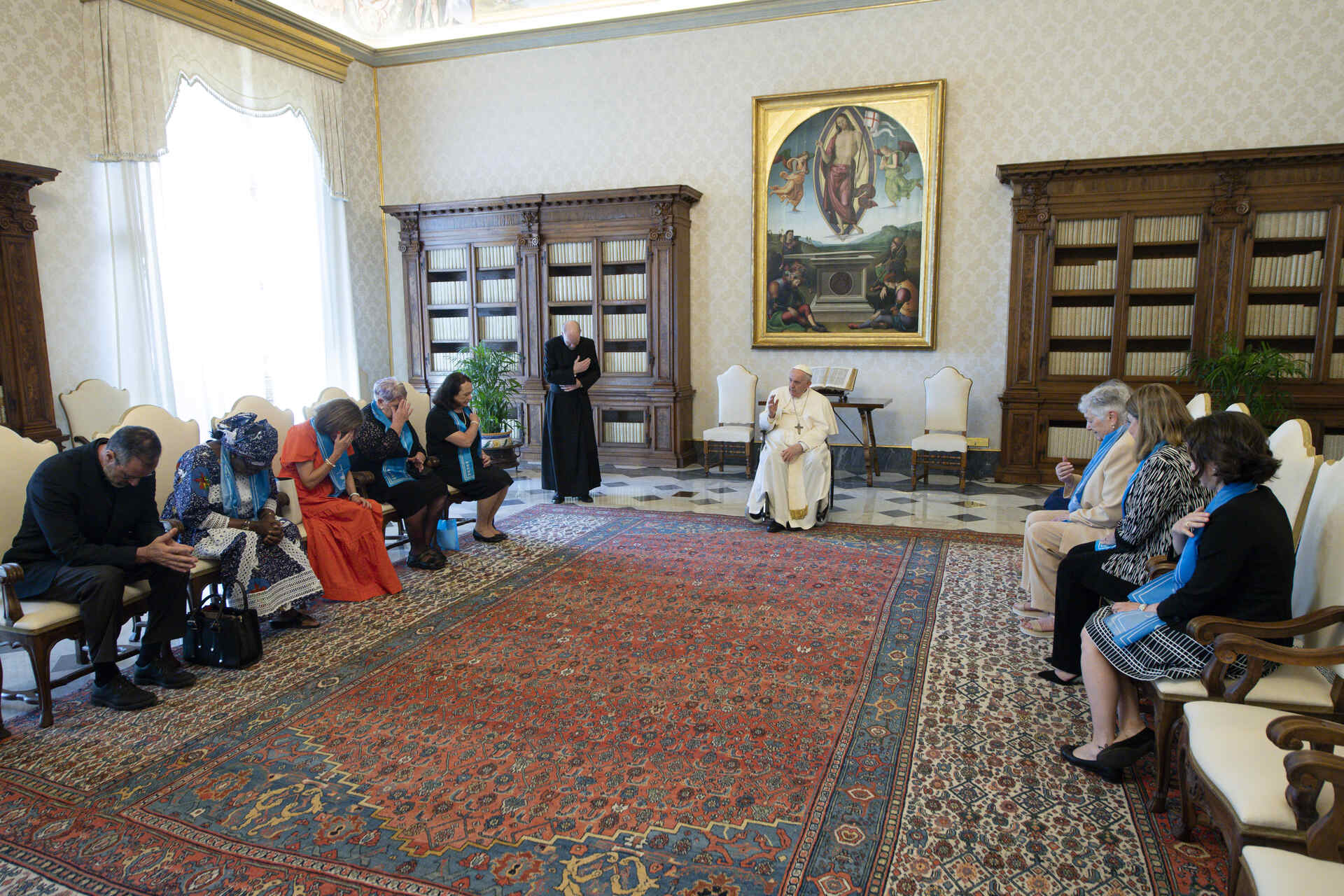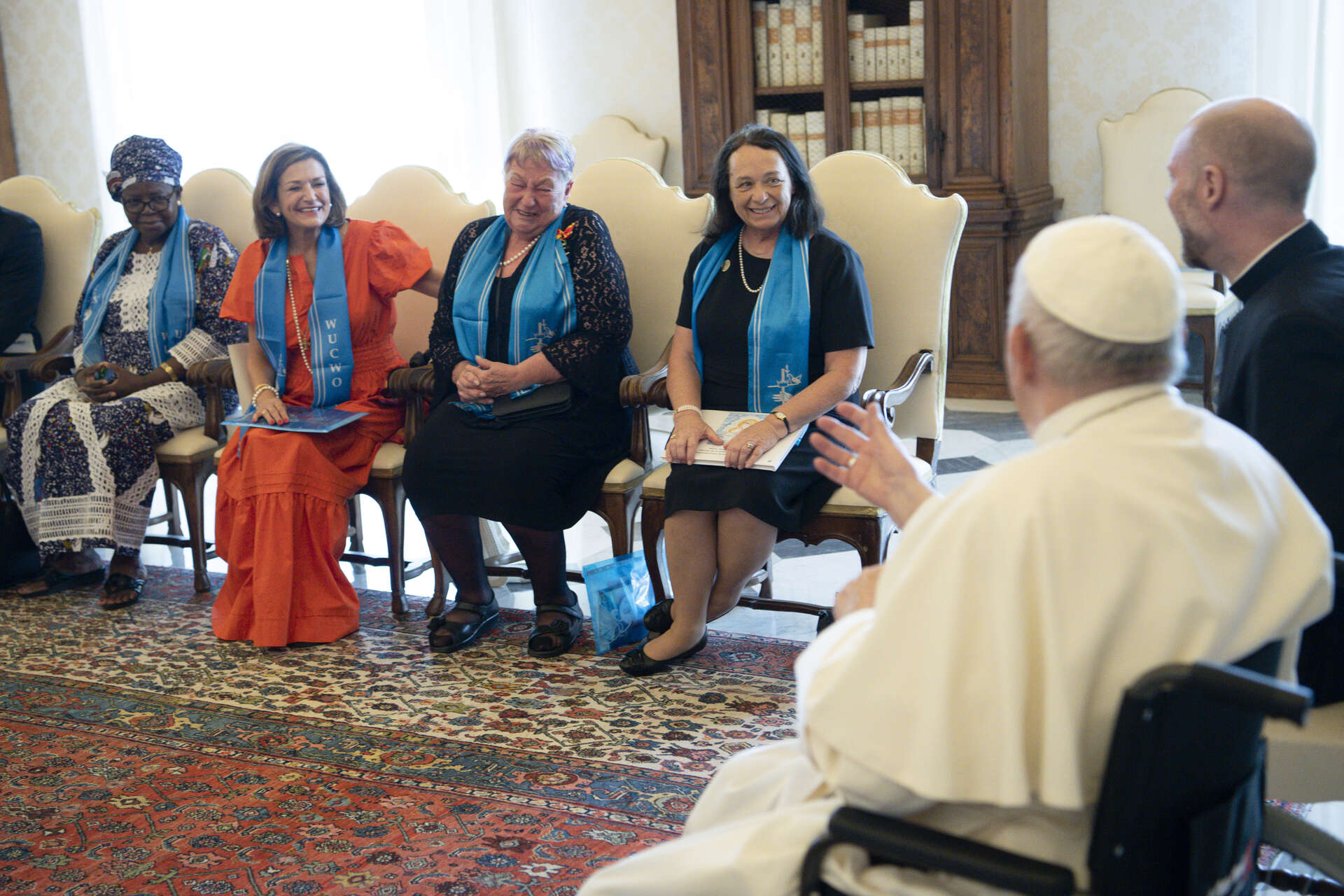
Maribeth Stewart Blogoslawski, a parishioner in the Archdiocese of Hartford, meets with Pope Francis to share the work of her organization’s members. She is vice president general and regional vice president, North America, for the World Union of Catholic Women’s Organisations. Photo © Vatican Media
Story by Shelley Wolf
WEST HAVEN – Some local Catholics might have been fortunate enough to see Pope Francis from a distance when he visited the United States in 2015. But what is it like to actually meet the Holy Father, the Vicar of Christ, up close and personal?
“He was fantastic. He was so incredibly full of life. He exudes warmth. And he has the most beautiful, warm smile,” says Maribeth Stewart Blogoslawski, a parishioner in the Archdiocese of Hartford at St. John XXIII Parish in West Haven.
Blogoslawski met Pope Francis in Rome last June during a 90-minute audience in her capacity as the vice president general and regional vice president, North America, for the World Union of Catholic Women’s Organisations, known as WUCWO. She and eight other women on the executive committee of WUCWO provided the pope with an update on the good works of their international organization.
“We were supposed to be with him for 90 minutes and it just flew by,” she says.
Pope Francis welcomed them into the library of the Apostolic Palace, where he sat in a wheelchair at the door to the room, due to his knee issues, and greeted each person individually. “He grasps your hands in both of his and looks right in your eyes and smiles that beautiful smile. Any trepidation you might have felt completely dissolves,” Blogoslawski says. He also has a great sense of humor, she adds.

Pope Francis blesses the eight women from the World Union of Catholic Women’s Organisations, as well as their ecclesiastical assistant, Father Marcelo Gidi Thumala, SJ, in the library of the Apostolic Palace in Rome. Photo © Vatican Media
The meeting was conducted in multiple languages. The group of women were told that Pope Francis would speak in Italian, but that he understands English.
Pope Francis then spoke in Italian, and Blogoslawski translated his words into Spanish for her group, since its members know either Italian or Spanish. Being American herself, she says, “I spoke to him in English, and he replied in Italian. He understood perfectly what I was saying.”
Blogoslawski characterized Pope Francis as “a great listener.” He asked for ideas and listened carefully, letting people complete their thoughts. His responses also indicated he understood what was said, she reports, and he expanded on topics in instructive and interesting ways.
Because he was a pastor, she says, “You feel like you are talking to your dad. He’s so easy to speak with and not at all pretentious. He gives people a chance to speak.”
In addition to discussing the good works of WUCWO member groups around the world, the conversation touched on the significance of women in the Church. Much of what Pope Francis had to say centered on Mary, the Mother of God, and her example for all.
“He spoke about the Marian and Petrine principles, using that as a springboard about how he feels the voice and presence of women in the Church needs to be heard and seen at all levels,” Blogoslawski says.
The Petrine principle refers to the structure of the Church based on Peter, the Apostles and their successors. The Marian principle, based on the example of Mary, is for the Church and all its people to respond to God’s love with love in return.
“He explained how the Marian principle is primary because it’s everyone’s call to holiness, doing what God wants you to do with your life. And he sees the Petrine principle reserved to men, because of Apostolic succession, but in service to the Marian principal, to help everyone answer the call to holiness properly, to help direct you,” Blogoslawski explains.
“So he used that as a springboard to say how women have so much to say that’s essential, and that their presence is equally important to men and should be recognized. And, indeed, he’s doing that,” she says.

Team members of WUCWO, comprised of women from around the world, are charmed by the pontiff before they present him with their book of service. Photo © Vatican Media
According to Blogoslawski, in recent years Pope Francis has appointed women to key posts within the Roman Curia, replacing some male lay Catholics. The most significant appointments, she says, include two female undersecretaries to the Vatican’s Dicastery for the Laity, the Family and Life; three female undersecretaries to the Secretariat of State; and three women to the Dicastery for Bishops, the department that selects new bishops.
Pope Francis’ concern for women, she says, and his desire to incorporate them more into the operations of the Church are heartfelt. “He feels women are important. And he’s bent on seeing this happen. That’s just an extraordinary difference that we are seeing with him,” she insists.
During the meeting with the WUCWO women, Pope Francis acknowledged that adding women to one of his finance councils has already made a difference. “Now it’s flying. They’re getting things done,” Blogoslawski relays. “He spoke about how women are very organized and able to do things because we’re used to juggling multiple tasks in our lives, we’re used to multitasking with families.
“He’s so sincere, and he’s not afraid to make these changes that he feels are necessary and right,” Blogoslawski says. He’s done it through changes to the Roman Curia, and now he is seeking input of the laity through the Synod on Synodality, she adds. “He wants to hear everyone’s voice equally.”
Founded in Europe in 1910 and headquartered in Rome, WUCWO brings under one umbrella more than 100 Catholic women’s organizations around the world, including the U.S.-based National Council of Catholic Women.
WUCWO is active in 50 countries and represents more than 8 million Catholic women. Its mission is to unite women in prayer and service, especially in the areas of poverty, education, and human rights. In recent years, the organization has fought against human trafficking, female mutilation, the lack of educational opportunities for women, and domestic violence. It also strives to keep children in the Church.
“Though we speak different languages, we’re bonded by our faith and that we are Catholic women praying together,” says Blogoslawski, who also represents WUCWO at the United Nations in New York City, where her organization has sponsored presentations to the UN’s Commission on the Status of Women.
For more information on the World Union of Catholic Women’s Organisations, visit wucwo.org.
